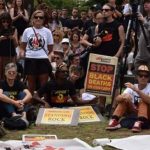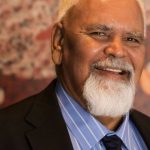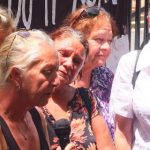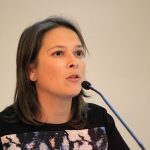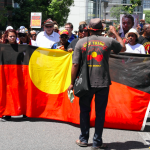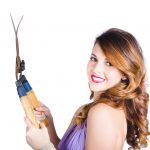Australian Black Panther Woman: An Interview with Activist Marlene Cummins
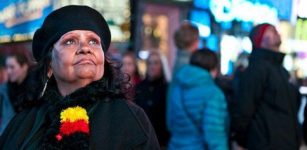
Marlene Cummins is Australia’s original Black Panther woman. Back in the early 70s, she joined the Brisbane chapter of the Australian Black Panther Party (ABPP) with the likes of Sammy Watson Jnr, Lionel Fogarty and Denis Walker.
The ABPP were a humanitarian organisation. They were fighting for the civil rights of Aboriginal and Torres Strait Islander people under a European government, which had systematically discriminated against them since the day their occupation of a land the First Peoples never ceded began.
The Australian Black Panthers drafted a ten point platform of demands – they were calling for land rights, education, legal services and beneficial pathways for their children.
The group also patrolled the streets at night to make sure that the police weren’t harassing local Indigenous people in Brisbane. Which incidentally is how the Aboriginal Legal Service started out in Redfern, as former NSW magistrate Pat O’Shane related to us recently.
The United States mob
Of course, the ABPP were heavily influenced by the Black Panther Party that originated in the States. Formed in California in 1966, the Black Panthers were a group of African Americans that were fighting for and asserting the rights of their people under the US government.
Coming off the back of the civil rights movement of the early 60s, the Panthers were led by the likes of Huey P Newton and Bobby Seale. Not only was this group affirming themselves culturally, but they were also initiating social programs, such as providing breakfast for children before school.
Leading prison industrial complex theorist, abolitionist and civil rights activist Angela Davis had close associations with the movement.
Doing the rounds
Today, Marlene Cummins is a local of Sydney’s Redfern. She’s a jazz singer and saxophonist, and if you’re lucky you might bump into her busking on King Street Newtown, as you’re making the rounds on a Saturday night.
The Kukuyelandji and Woppaburra woman was born in Cunnamulla, Queensland. But her family moved around the outback for years for employment reasons before gravitating towards Brisbane. And that’s where in her late teens some ABPP leaders turned her on politically.
The doco
In 2014, Blackfella Films released the documentary Black Panther Woman, which explored the life of Ms Cummins.
It documents her times with the ABPP, when they were at the forefront of demonstrations like the Aboriginal Tent Embassy, and follows her on a recent journey to New York where Black Panthers from around the world met for a conference.
Marloo’s Blues
Marlene released a jazz album in 2014 called Koori Woman Blues, which has been described as a series of “courageous stories of women’s rights, injustice and addiction.” Cummins also runs a popular blues program called Marloo’s Blues on Koori Radio 93.7FM at 10 am on Sundays.
Sydney Criminal Lawyers® spoke with Marlene Cummins about her early life as a radical activist, the plight of Australia’s First Nations peoples and the violence against women that plagues Australia as a whole.
In 1972, in your late teens you joined the Brisbane chapter of the Australian Black Panther Party (ABPP). Can you tell me about what the ABPP stood for? And who was involved in it at the time?
Well it was founded by Denis Walker and Sammy Watson Jnr. I was the first recruit.
I met them at a community dance that we used to hold. Because we were so alienated from the general white community, we’d have our own functions. And this was at the Aboriginal community dance called “The Open Door.”
I met Sammy Watson Jnr and Denis Walker. And they were talking.
I’d just completed a whole full circle of going around Australia trying to get work. And I was young and still a bit naïve. I had experienced racism, but when I did some hitchhiking – because that was the advent of a certain subculture of hitchhikers, the hippies – I experienced a lot of racism and a lot of it was violent too.
I tried to get work. So I did that full circle and I experienced the full brunt of racism – at its most violent level at times.
I got back up to Brisbane. You see I tried to fit in there at an early age. I did it on my own, with no support from anyone, and it was horrendous.
And so by the time I got back up to Brisbane, I met Sammy Watson and they were saying all this stuff that I needed to hear. And I hadn’t heard from anybody before.
They were talking very politically astutely and very politically intelligently. Beyond anything I’d ever heard anyone speak before. And it all made sense.
I use the terminology: they turned on the light.
You were inspired by the American Black Panther Party. What was it about that movement that drew you all to it? And what would you say were the differences between the American and the Australian movements?
Well there was no real difference, in the sense of dealing with a system that’s been pretty much against you since the word go: black people being exploited and oppressed systematically.
Not from just from a general dominant community, but the institutions of racism, be it the so-called justice system, education, health, the whole bit.
Basically, the Black Panthers were demonised because the powers that be – that oppressed black people – weren’t used to a group of people taking a stand and getting legally aware of their rights.
There was one difference though. They were fighting for the constitutional right to carry a gun. But we didn’t apply that to our thing because that wasn’t us. We just took what was a common ground situation with them and left the rest.
In that regard, it’s because they come from a gun culture.
And despite all the atrocities perpetrated upon us since the invasion of this country, we have never picked up the gun. And that hasn’t even been recognised.
Other countries whose rights have been violated have chosen an armed resistance. But we’ve never ever done that, right up until this day.
The ABPP were an activist group. What sort of actions did you take?
We were a humanitarian group. But we had labels like the Panthers had attached to us to render us powerless. They were demonised and we were demonised too.
Because in some of the media, some of the headlines were “Black Power Reaches Our Shores.” Things like that. There was that demonising sort of situation.
We were a humanitarian group speaking out for health, education, legal rights and systems of addressing our children’s situations.
We were demonised because that’s what the American’s did to the Black Panthers over there. And I guess those powers that be that oppressed black people systematically, that’s what they do.
They have the media in their pocket. And the media have been, if anything, responsible in perpetrating acts of violating people’s human rights and perpetuating it with the rights of our people – the Aboriginal people of Australia.
But in the 2015 documentary about your life Black Panther Woman you spoke out about the sexism that you and other women around you at the time were subjected to. Looking back, would you say that conditions have improved for women today?
No see, what I pointed out – I got a little bit annoyed if you like – I addressed misogyny in Black Panther Woman, because misogyny is everywhere. Probably worse then, and it hasn’t changed much now.
I addressed misogyny coming from all backgrounds. And if you listen to Black Panther Woman properly, you’ll hear that Aboriginal women didn’t go to the police.
Why would you go to a so-called system of justice that is against you and Aboriginal men? That’s why we stayed quiet.
We also stayed quiet because of the demonization of Aboriginal men.
Aboriginal people are always under what I call “the missionary mentality,” which has been perpetrated by government policies, by the education system and it’s inherent in people in general now.
I addressed violence on women – if you listen properly – and in this case it was Aboriginal women, and why it was difficult for Aboriginal women to report it.
This violence is endemic in this society to ridiculous proportions. They’re women from all backgrounds. And particularly in this country, there’s actually more white women dying from male perpetrated violence – from husbands and relationships. There’s women dying every week without fail.
It’s not saying we aren’t subjected to these social evils now – we’re displaced from our culture and everything that’s rightfully ours as Aboriginal people. But when an Aboriginal man perpetrates this, the race card gets pulled to be used against all Aboriginal people – “the missionary mentality.” Everybody’s got to pay for it.
Now if you’re going to bring in the army, as in the case of the Intervention in the Northern Territory, for sexual abuse and violence on women, bring it in for everybody.
It’s very difficult for an Aboriginal woman. I was addressing why it was difficult for Aboriginal women. Even despite the Royal Commission into Aboriginal deaths in custody, thirty years ago, it hasn’t changed. If anything it’s gotten worse.
So you understand this?
I’m understanding what you’re saying is that you were addressing violence towards women, not specifically towards Aboriginal women, and that it happens throughout the whole community – to all women.
Yeah, but I am specific about why it’s more difficult for an Aboriginal woman to report it.
Because we get women dying from deaths in custody. Women are afraid. There’s a general fear of the so-called justice system in this country because the justice system has not ever been fair, despite even situations of when it’s obvious in this country.
As in the case of Mulrunji Doomadgee from Palm Island, Ms Dhu in Western Australia and so many other people, even our children aren’t safe. T J Hickey, Daniel Yock, 16 from Brisbane and young teenager Ms Dhu.
So are we going to go to report something? We don’t have a guarantee. A lot of situations in regards to crimes perpetrated on Aboriginal women, and men for the most part, are ignored and not taken seriously.
When there’s a situation that a man murders a white woman there’s a national outcry.
Aboriginal women are the most abused, battered, beaten, disrespected, violated persons in this country.
This is what Black Panther Woman is about.
This prompts my next question. Today, there’s an overrepresentation of Australia’s First Peoples in prison. Indigenous people make up 27 percent of the incarcerated population, but only 2 percent of the overall Australian population.
Why is this situation still going on today? And what needs to happen in order to rectify it?
It’s systematic racism. Even when it’s glaringly obvious with Mulrunji Doomadgee. He just asked a policeman to leave his brother alone, as he was drunk and to lighten up. An hour later Mulrunji was dead. And it was glaringly obvious.
No policeman or woman who has been implicated in the deaths in custody of this country have ever been charged, even when it’s glaringly obvious, they get off.
Sergeant Hurley got a promotion. He had the Queensland police force rally around him. And he was compensated for stress.
People have no idea of the daily psychological, mental toll of racism. What it takes from Aboriginal people in this country due to this social injustice. They have no idea. And they don’t really care either.
And to have someone like Pauline Hanson in the Senate speaks for itself.
That’s true.
Over recent years, there’s been a focus on the continuing stolen generations. It’s been reported that more Indigenous children are being taken from their homes today, than at any other time in Australian history. And NSW has the highest number of child removals in the country.
Why’s this occurring now? And how is it affecting the community?
Like it always has. Once again the systematic racism – institutionalised racism of this country. When I say systematic, it’s a perpetual ongoing, institutionalised racism, that’s been handed down from generation to generation.
It’s still very dark ages.
We’re living in 2017. Australia’s got an appalling record of abuses of human rights in this country. But somehow they seem to escape, even when we’ve had people out here from the United Nations. They get told to go home and leave Aussies to their own makings.
It’s just this big denial problem. It’s just never really been focused on and addressed enough. This institutionalised racism of injustice, deaths in custody, and the stolen generation.
I mean, it’s obvious and evident of why this is still happening.
At the moment, there’s a big focus on constitutional recognition: the move to recognise Aboriginal and Torres Strait Islander people in the constitution. But many Indigenous people think this doesn’t go far enough and what’s really needed are treaties with the various First Nations peoples.
Where do you stand on this issue?
I’m totally against the Recognise situation. It’s another systematic plot to render us powerless. It’s all about being powerless.
Now there’s two words getting bandied around lately: extreme terrorism. This country was built on extreme terrorism. We never ceded our sovereignty.
With Eddie Mabo, that’s where he knew that the very law that this country is built on – so-called laws of honesty and decency and democracy – they were all broken conveniently.
Until they acknowledge that we’re the sovereign rightful owners of this country – because the sovereignty was never ceded, they broke their own laws and they still continue to incorporate those laws into modern decision making processes today in regards to political decisions – until they undo the dishonesty of the fact that this country was invaded, then we may get somewhere.
This is why they have to keep doing little bullshit things like Recognise, because they know that they have to find some little tokenistic thing, like “sorry” – that’s bullshit. It’s good that he did that, but sorry doesn’t mean anything if there’s no action.
Sorry is about action. I respect the man for saying that, but there was no act to display the depth. If you’re sorry, you don’t just say it, you follow it up with action.
And all these issues that we’re addressing now are where action should be taken. It’s appalling the situation of deaths in custody here. So many people. Because Aboriginal people, our cultural rights as a race of people are violated.
We come from an extended family situation. What affects an Aboriginal woman on the east coast affects another Aboriginal person on the west coast.
That affects us when we hear about that young girl, and see that footage of the police dragging her when she’s sick and they say she’s pretending.
And then that old man that was put in the back of a police van in fifty degrees heat. He literally baked in the back of the van like a roast.
People have no idea. And they won’t even address racism in this country.
You see these panels on TV. I don’t know how many times they’ve had a panel about, “Are we a racist country?” Why are you asking yourself that over and over?
Why is that the continual question? Because it is a racist country.
And I do have one last question for you. And it’s a bit off the subject matter. You’re a jazz singer and saxophonist. You released the album Koori Woman Blues in 2014. And you also run a radio program on Koori Radio called Marloo’s Blues.
Can you tell us a bit about what it’s like living the life of a muso?
This stuff isn’t unrelated. This stuff is related to who I am. And it’s connected to the past because in the past we were able to be at the forefront and things have changed.
A lot of Aboriginal people have been handpicked into the system to go along with things. Once again, these people managed to get where they are because they’re handpicked. They keep things subtle. They don’t really rock the boat in regards to social injustice. And if they do they get some kind of tag to invalidate them.
So while I’m still an activist, I’m doing it with my music and my art. Because I find that’s the only platform where I can do it. I can call the shots.
Even when I go busking, I’m not even limited. I engage with a lot of wonderful young non-Indigenous people of this country. They’re a different generation. And they’ve got more of a sense of wanting to learn the truth and do whatever they can to address the plight of Aboriginal people in this country.
My album has got songs in it addressing stolen wages. It’s got a good balance. There’s a couple of cultural songs.
And then there’s a song called “Payback” and that’s a spiritual gospel that I wrote in regards to the philosophy of Aboriginal people.
I mean, why did Aboriginal people survive for as long as they have? Because they had a compounding kind of foundation that was integrated into how you treat each other and the land and all the flora and fauna. That’s all integrated into a survival.
There’s this kind of uneducated sort of attitude towards Aboriginal people in regards to how we get our intelligence measured. Like the fact that we didn’t invent the wheel and superficial surface things, like we wore minimal clothing.
Well at the end of the day, what prevailed was the acute sensitivity towards the environment, towards each other’s survival and all the flora and fauna. And those attitudes could very well be incorporated into modern educational practices today.
Marlene thanks very much for taking the time out to tell us about your intriguing life. And we’ll all be tuned into Koori Radio 93.7FM next Sunday at 10 am to hear you play some tunes on Marloo’s Blues.
And thank you.
Phot credit: Alina Gozin’a


